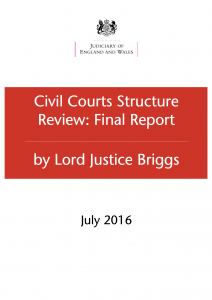This year’s annual Tom Sargant Memorial lecture, delivered by the Rt. Hon. Sir Michael Briggs, Lord Justice of Appeal, on Tuesday 18th October at Shearman & Sterling LLP, covered the possibility of having a new online court, acting in conjunction with today’s court system. This comes after the announcement in September that the Ministry of Justice is committed to a £1 billion programme of court reform (see Transforming Our Justice System (Sep 2016)).
 Briggs explained the desire for law courts to harness technological advances and the need to catch up with other institutions that are more advanced in the field. The online system would go further than simply digitising current paper-based processes, taking an investigative approach in how it would resolve solutions (rather than the more conventional adversarial approach). The idea being that relatively simple cases could be resolved online, without the added time and costs needed in regular court litigation.
Briggs explained the desire for law courts to harness technological advances and the need to catch up with other institutions that are more advanced in the field. The online system would go further than simply digitising current paper-based processes, taking an investigative approach in how it would resolve solutions (rather than the more conventional adversarial approach). The idea being that relatively simple cases could be resolved online, without the added time and costs needed in regular court litigation.
Professor Richard Susskind was mentioned as a visionary for his understanding of how computers would ultimately replace lawyers and even judges. In 2015, along with a host of distinguished academic, IT and legal experts, Susskind produced a compelling report (Online Dispute Resolution – for Low Value Civil Claims courtesy of the Online Dispute Resolution Advisory Group (Feb 2015)) which essentially argued that the majority of low value civil claims – below £25,0000 – should be taken to ‘Her Majesty’s Online Court’ (HMOC). The procedure would entail a three step system: online evaluation, used without third party assistance; online facilitators, using independent online facilitators trained in mediation; and finally online judges, who would work primarily online but could also take part in telephone conferences, and would have a discretionary power to transfer cases to the conventional courts if their complexity or public importance warranted it.
The Lord Chief Justice’s Report of April 2015 suggested that centre stage should instead be taken by a new investigatory court official, called a ‘Registrar’. This person would essentially be the primary dispute resolution officer and would take a proactive approach to get to the heart of cases quicker. They would also be legally trained and would specialise in particular types of litigation. Briggs suggested that the role of the Registrar was perhaps the ‘most interesting’ thing to come out of the report.
The idea of creating an online court came from a number of international jurisdictions. One such is British Columbia, which has produced a successful online system, the Civil Resolution Tribunal, and forms the principle example of how we might go about creating an online dispute resolution (ODR) court. The concept of ‘cybersettle’, used most notably by eBay, could also allow individuals to settle money claims without a third party, taking part in an online bidding process to reach a settlement by bids matching (if unmatched bids remain confidential to respective party).

The British system would therefore harness the technology used in British Columbia to create the Online Solutions Court. But why do we need it? Briggs emphasised that the current court system of England and Wales, despite being one of the best in the world, simply does not accommodate for ordinary people or small business when trying to resolve claims of moderate to small cost (except from particulars of claim like personal injuries). In part due to the disproportionate cost of legal services compared with the small value at stake, but also because the costs risk of being the loser makes the litigation doubly disproportionate. This, paired with the fact that legal vocabulary is almost unnavigable for a lay person who has not trained in law, makes the system severely unfair for people without money or legal training. Further, the ‘advice deficit’ created by legal aid cuts and austerity means that the need for a new online court is greater than ever, as it will allow for a more cost effective and efficient court system.
Briggs received not a single affirmative reply when he asked several lawyers “which of you would recommend to a non-lawyer friend bringing a claim in our civil courts, other than for personal injuries, where the value at risk was £25,000 or less?”. This surely evidences the shortcomings of the current system – especially considering the ‘advice deficit’ created by legal aid cuts – and the need for a more affordable and efficient solution for small claims.
 The idea of online dispute resolution has not come without resistance. There is the general fear that with cases moving online, lawyers and judges will have less work and therefore it may damage the name of the profession. Certain litigation lawyers have argued that the Online Solutions Court would create a ‘second class service’ by excluding its users from the benefits of professional legal advice and representation.
The idea of online dispute resolution has not come without resistance. There is the general fear that with cases moving online, lawyers and judges will have less work and therefore it may damage the name of the profession. Certain litigation lawyers have argued that the Online Solutions Court would create a ‘second class service’ by excluding its users from the benefits of professional legal advice and representation.
There is also the pragmatic consideration that the online system may exclude members of society who struggle with computers or who are less technologically able. Briggs’ way of resolving this issues seems to be the suggestion of a ‘permeable membrane’ between court systems (online and convention), allowing cases to pass through on grounds of complexity and public importance.
The Reform Programme is due to be completed in 2022, by which time Briggs hopes that all civil courts will be accessible online. We will have to wait how this potentially pivotal change in the English court system develops in the coming years, and how the new software will manifest itself when up and running.

Though not being free, the considerably cheaper option of the online court will lessen the financial barrier to justice that is currently in play. Hopefully this will give ordinary people and small businesses access to the civil justice that they should be entitled to.
Want to read more about the proposed changes? Take a look at the the Civil Courts Structure Review: Final Report (July 2016) by Lord Justice Briggs.
Many thanks to Oscar Davies for reviewing this event for Lawbore.
Oscar undertook a French & History degree at King’s College London, specialising in gender and queer theory. He is looking to go into the Bar, and is interested in the commercial side, especially media law.

